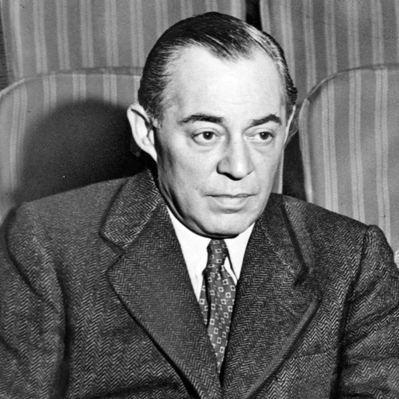- 1. Early life and education
- 2. Career
- 2.1. Rodgers and Hammerstein
- 2.2. After Hammerstein

RODGERS
Richard
Composer
Date of Birth: 28 June 1902
Date death: 30 December 1979
Age at the time of death: 77 years old
Zodiac sign: Cancer
Profession: Composer
Biography
Richard Charles Rodgers was an American composer who worked primarily in musical theater. With 43 Broadway musicals and over 900 songs to his credit, Rodgers was one of the most important American composers of the 20th century, and his compositions had a significant influence on popular music.
Rogers is known for his songwriting partnerships, first with lyricist Lorenz Hart and then with Oscar Hammerstein II. With Hart he wrote musicals throughout the 1920s and 1930s, including Pal Joey, A Connecticut Yankee, On Your Toes and Babes in Arms. With Hammerstein he wrote musicals through the 1940s and 1950s, such as Oklahoma!, Flower Drum Song, Carousel, South Pacific, The King and I, and The Sound of Music. His collaborations with Hammerstein, in particular, are celebrated for bringing the Broadway musical to a new maturity by telling stories that were focused around characters and drama rather than the earlier light-hearted entertainment of the genre.
Rodgers was the first person to win all four of the top American entertainment awards in theater, film, recording, and television – a Tony, an Oscar, a Grammy, and an Emmy – now known collectively as an EGOT. In addition, he was awarded a Pulitzer Prize, making him one of only two people to receive all five awards (Marvin Hamlisch is the other). In 1978, Rodgers was in the inaugural group of Kennedy Center Honorees for lifetime achievement in the arts.
Early life and education
Born into a Jewish family in Queens, New York, Rodgers was the son of Mamie (Levy) and Dr. William Abrahams Rodgers, a prominent physician who had changed the family name from Rogazinsky. Rodgers began playing the piano at the age of six. He attended P.S. 166, Townsend Harris Hall and DeWitt Clinton High School. Rodgers spent his early teenage summers in Camp Wigwam (Waterford, Maine) where he composed some of his first songs.
Rodgers, Lorenz Hart, and later collaborator Oscar Hammerstein II all attended Columbia University. At Columbia, Rodgers joined the Pi Lambda Phi fraternity. In 1921, Rodgers shifted his studies to the Institute of Musical Art (now the Juilliard School). Rodgers was influenced by composers such as Victor Herbert and Jerome Kern, as well as by the operettas his parents took him to see on Broadway when he was a child.
Career
In 1919, Richard met Lorenz Hart, thanks to Phillip Levitt, a friend of Richard's older brother. Rodgers and Hart struggled for years in the field of musical comedy, writing several amateur shows. They made their professional debut with the song "Any Old Place With You", featured in the 1919 Broadway musical comedy A Lonely Romeo. Their first professional production was the 1920 Poor Little Ritz Girl, which also had music by Sigmund Romberg. Their next professional show, The Melody Man, did not premiere until 1924.
When he was just out of college Rodgers worked as musical director for Lew Fields. Among the stars he accompanied were Nora Bayes and Fred Allen. Rodgers was considering quitting show business altogether to sell children's underwear, when he and Hart finally broke through in 1925. They wrote the songs for a benefit show presented by the prestigious Theatre Guild, called The Garrick Gaieties, and the critics found the show fresh and delightful. Only meant to run one day, the Guild knew they had a success and allowed it to re-open later. The show's biggest hit—the song that Rodgers believed "made" Rodgers and Hart—was "Manhattan". The two were now a Broadway songwriting force.
Throughout the rest of the decade, the duo wrote several hit shows for both Broadway and London, including Dearest Enemy (1925), The Girl Friend (1926), Peggy-Ann (1926), A Connecticut Yankee (1927), and Present Arms (1928). Their 1920s shows produced standards such as "Here in My Arms", "Mountain Greenery", "Blue Room", "My Heart Stood Still" and "You Took Advantage of Me".
With the Depression in full swing during the first half of the 1930s, the team sought greener pastures in Hollywood. The hardworking Rodgers later regretted these relatively fallow years, but he and Hart did write some classic songs and film scores while out west, including Love Me Tonight (1932) (directed by Rouben Mamoulian, who would later direct Rodgers's Oklahoma! on Broadway), which introduced three standards: "Lover", "Mimi", and "Isn't It Romantic?". Rodgers also wrote a melody for which Hart wrote three consecutive lyrics which either were cut, not recorded or not a hit. The fourth lyric resulted in one of their most famous songs, "Blue Moon". Other film work includes the scores to The Phantom President (1932), starring George M. Cohan, Hallelujah, I’m a Bum (1933), starring Al Jolson, and, in a quick return after having left Hollywood, Mississippi (1935), starring Bing Crosby and W. C. Fields.
In 1935, they returned to Broadway and wrote an almost unbroken string of hit shows that ended shortly before Hart's death in 1943. Among the most notable are Jumbo (1935), On Your Toes (1936, which included the ballet "Slaughter on Tenth Avenue", choreographed by George Balanchine), Babes in Arms (1937), I Married an Angel (1938), The Boys from Syracuse (1938), Pal Joey (1940), and their last original work, By Jupiter (1942). Rodgers also contributed to the book on several of these shows.
Many of the songs from these shows are still sung and remembered, including "The Most Beautiful Girl in the World", "My Romance", "Little Girl Blue", "I'll Tell the Man in the Street", "There's a Small Hotel", "Where or When", "My Funny Valentine", "The Lady Is a Tramp", "Falling in Love with Love", "Bewitched, Bothered and Bewildered", and "Wait till You See Her".
In 1939, Rodgers wrote the ballet Ghost Town for the Ballet Russe de Monte Carlo, with choreography by Marc Platoff.
Rodgers and Hammerstein
Rodgers' partnership with Hart began having problems because of the lyricist's unreliability and declining health. Rodgers began working with Oscar Hammerstein II, with whom he had previously written songs (before ever working with Lorenz Hart). Their first musical, the groundbreaking hit Oklahoma! (1943), marked the beginning of the most successful partnership in American musical theatre history. Their work revolutionized the musical form. What was once a collection of songs, dances and comic turns held together by a tenuous plot became a fully integrated piece.
The team went on to create four more hits that are among the most popular in musical history. Each was made into a successful film: Carousel (1945), South Pacific (1949, winner of the 1950 Pulitzer Prize for Drama), The King and I (1951), and The Sound of Music (1959). Other shows include the minor hit Flower Drum Song (1958), as well as relative failures Allegro (1947), Me and Juliet (1953), and Pipe Dream (1955). They also wrote the score to the film State Fair (1945) (which was remade in 1962 with Pat Boone) and a special TV musical of Cinderella (1957).
Their collaboration produced many well-known songs, including "Oh, What a Beautiful Mornin'", "People Will Say We're in Love", "Oklahoma" (which also became the state song of Oklahoma), "It's A Grand Night For Singing", "If I Loved You", "You'll Never Walk Alone", "It Might as Well Be Spring", "Some Enchanted Evening", "Younger Than Springtime", "Bali Hai", "Getting to Know You", "My Favorite Things", "The Sound of Music", "Sixteen Going on Seventeen", "Climb Ev'ry Mountain", "Do-Re-Mi", and "Edelweiss", Hammerstein's last song.
Much of Rodgers' work with both Hart and Hammerstein was orchestrated by Robert Russell Bennett. Rodgers composed twelve themes, which Bennett used in preparing the orchestra score for the 26-episode World War II television documentary Victory at Sea (1952–53). This NBC production pioneered the "compilation documentary"—programming based on pre-existing footage—and was eventually broadcast in dozens of countries. The melody of the popular song "No Other Love" was later taken from the Victory at Sea theme entitled "Beneath the Southern Cross". Rodgers won an Emmy for the music for the ABC documentary Winston Churchill: The Valiant Years, scored by Eddie Sauter, Hershy Kay, and Robert Emmett Dolan. Rodgers composed the theme music, "March of the Clowns", for the 1963–64 television series The Greatest Show on Earth, which ran for 30 episodes. He also contributed the main-title theme for the 1963–64 historical anthology television series The Great Adventure.
In 1950, Rodgers and Hammerstein received The Hundred Year Association of New York's Gold Medal Award "in recognition of outstanding contributions to the City of New York." Rodgers, Hammerstein, and Joshua Logan won the Pulitzer Prize for Drama for South Pacific. Rodgers and Hammerstein had won a special Pulitzer Prize in 1944 for Oklahoma!.
In 1954, Rodgers conducted the New York Philharmonic Orchestra in excerpts from Victory at Sea, Slaughter on Tenth Avenue and the Carousel Waltz for a special LP released by Columbia Records.
Rodgers and Hammerstein musicals earned a total of 37 Tony Awards, 15 Academy Awards, two Pulitzer Prizes, two Grammy Awards, and two Emmy Awards.
After Hammerstein
After Hammerstein's death in 1960, Rodgers wrote both words and music for his first new Broadway project No Strings (1962, which earned two Tony Awards). The show was a minor hit and featured the song, "The Sweetest Sounds".
Rodgers also wrote both the words and music for two new songs used in the film version of The Sound of Music. (Other songs in that film were from Rodgers and Hammerstein.)
Rodgers went on to work with lyricists: Stephen Sondheim (Do I Hear a Waltz?) who was a protégé of Hammerstein, Martin Charnin (Two by Two, I Remember Mama) and Sheldon Harnick (Rex).
At its 1978 commencement ceremonies, Barnard College awarded Rodgers its highest honor, the Barnard Medal of Distinction.
Rodgers was an honoree at the first Kennedy Center Honors in 1978.
At the 1979 Tony Awards ceremony—six months before his death—Rodgers was presented the Lawrence Langner Memorial Award for Distinguished Lifetime Achievement in the American Theatre.
Mentions in the news
Born in one day
.
Horoscope Cancer: horoscope for today, horoscope for tomorrow, horoscope for week, horoscope for month, horoscope for year.











































